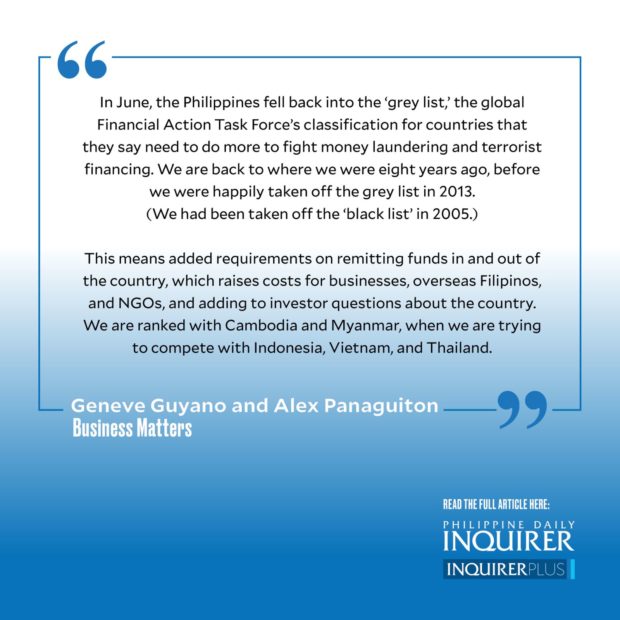Getting out of the ‘grey list’
In June, the Philippines fell back into the “grey list,” the global Financial Action Task Force’s (FATF) classification for countries that they say need to do more to fight money laundering and terrorist financing. We are back to where we were eight years ago, before we were happily taken off the grey list in 2013. (We had been taken off the “black list” in 2005.)
This means added requirements on remitting funds in and out of the country, which raises costs for businesses, overseas Filipinos, and nongovernmental organizations, and adding to investor questions about the country. We are ranked with Cambodia and Myanmar, when we are trying to compete with Indonesia, Vietnam, and Thailand.
In putting the Philippines in the grey list, the FATF cited areas the country needed to work on. No. 1: Demonstrate effective risk-based supervision of DNFBPs, or designated non-financial businesses and professions, i.e., real estate agents, jewelers, lawyers, accountants. No. 2: Mitigate risks associated with casino junkets. No. 3: Implement new registration requirements for MVTS, or money and value transfer services, i.e., remittance companies.
In September, the Makati Business Club (MBC) and the US-based Center for International Private Enterprise (CIPE) organized the forum “Out of the Grey List: Meeting Global Standards Against Financial Crime and Corruption Prevention.” There, Bangko Sentral Governor Ben Diokno and Anti-Money Laundering Council (AMLC) executive director Mel Georgie Racela outlined what they were doing to get the Philippines out of the list.
Then, private sector representatives discussed what they could do to help.
“Businesses have a role because we are involved in the largest transactions and, in the case of the banks, most transactions big or small pass through us,” said MBC chair Edgar O. Chua. “We have the responsibility to maintain integrity and highest ethical standards on our own and among our partners, consumers, suppliers, and other stakeholders.”
Banks are in a good position to help these sectors tighten their procedures because, well, been there, done that. In fact, Wick Veloso, president of Philippine National Bank and new president of the Bankers Association of the Philippines, recounted how, when his previous employer was investigated for lax enforcement, the Federal Bureau of Investigation and other investigators swooped down on its offices around the world.
Banks practice KYC, or “know your customer.” This means knowing or finding out where your customer got his money. If the bank is not satisfied with the answer, they don’t accept the deposit, or don’t remit the money. If it’s dirty money, that means it stays dirty, instead of being laundered. With their experience, banks can now help non-banks learn to do the same, Veloso said.
“They don’t have the kind of instinct to determine whether a financial crime is happening,” Veloso said. “The role for banks and other business associations is to educate them further and have this curiosity embedded in each of everyone. It is the curiosity that will allow you to report. Anything that is not reported will not be captured.” But a so-called suspicious transaction report gives the AMLC “all the power to put into motion the laws,” he added.
That will help get us out of the grey list, which would be good for businesses and overseas Filipinos and help attract investors at a time when we need all the help we can get to support and expand businesses and jobs. It will also make it harder for crooks to launder money by buying property, jewelry, art, and, yes, sports cars.
——————
Geneve Guyano and Alex Panaguiton are project officers at the Makati Business Club.
——————
Business Matters is a project of the Makati Business Club ([email protected]).
















